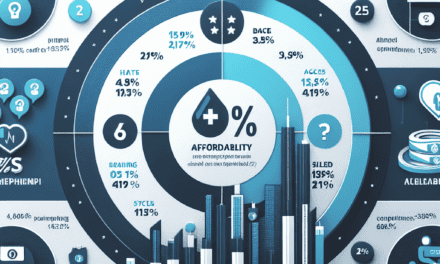Democrats Call on Republicans to Address Medicare Advantage Upcoding Over Medicaid Cuts
The ongoing debate surrounding healthcare in the United States has taken a new turn as Democrats are urging Republicans to address the issue of Medicare Advantage upcoding while simultaneously criticizing cuts to Medicaid. This article delves into the complexities of Medicare Advantage, the implications of upcoding, the impact of Medicaid cuts, and the broader political landscape that shapes these discussions. By examining these interconnected issues, we can better understand the stakes involved for millions of Americans who rely on these programs for their healthcare needs.
Understanding Medicare Advantage and Its Role in Healthcare
Medicare Advantage (MA) plans, also known as Medicare Part C, are an alternative to traditional Medicare. These plans are offered by private insurance companies and provide a range of services, often including additional benefits not covered by traditional Medicare. Understanding the structure and function of Medicare Advantage is crucial to grasping the implications of upcoding and the political discourse surrounding it.
- What is Medicare Advantage? Medicare Advantage plans combine coverage from Medicare Parts A and B, and often include Part D (prescription drug coverage). These plans may also offer additional services such as dental, vision, and wellness programs.
- Enrollment Trends: As of 2023, over 28 million Americans are enrolled in Medicare Advantage plans, representing approximately 45% of all Medicare beneficiaries. This number has been steadily increasing, reflecting a growing preference for managed care options.
- Funding and Payments: Medicare Advantage plans receive funding from the federal government based on a risk-adjusted payment model. This means that plans receive higher payments for enrollees with more complex health needs, incentivizing them to accurately report patient diagnoses.
The rise of Medicare Advantage has been accompanied by concerns about the accuracy of diagnosis coding, which directly affects the payments that these plans receive. This brings us to the issue of upcoding.
The Issue of Upcoding in Medicare Advantage
Upcoding refers to the practice of assigning a higher-level diagnosis code than is warranted by a patient’s actual health status. This practice can lead to inflated payments from Medicare, raising ethical and financial concerns. Understanding the implications of upcoding is essential for grasping the current political climate surrounding Medicare Advantage.
- How Upcoding Works: When a healthcare provider submits a claim for reimbursement, they must include diagnosis codes that reflect the patient’s health conditions. If a provider submits a code that indicates a more severe condition than what the patient has, this can result in higher reimbursement rates.
- Financial Impact: According to a 2021 report from the Office of Inspector General (OIG), Medicare Advantage plans received approximately $12 billion in excess payments due to upcoding practices. This not only affects the integrity of the Medicare program but also diverts funds from other essential healthcare services.
- Legal and Regulatory Responses: The Centers for Medicare & Medicaid Services (CMS) has implemented various measures to combat upcoding, including audits and risk adjustment data validation. However, critics argue that these measures are insufficient to deter the practice.
Upcoding not only raises ethical questions but also has significant implications for the overall healthcare system, particularly in how funds are allocated and managed. This brings us to the broader context of Medicaid cuts.
The Impact of Medicaid Cuts on Vulnerable Populations
Medicaid is a critical program that provides health coverage to low-income individuals and families, including children, pregnant women, elderly individuals, and people with disabilities. Recent discussions around Medicaid cuts have raised alarms about the potential consequences for millions of Americans who rely on this safety net.
- Current Medicaid Landscape: As of 2023, Medicaid covers over 80 million Americans. The program is jointly funded by the federal and state governments, with states having significant flexibility in how they administer their programs.
- Recent Cuts and Their Rationale: In recent years, some states have implemented cuts to Medicaid as part of broader budgetary measures. Proponents argue that these cuts are necessary to control spending, while opponents contend that they disproportionately affect vulnerable populations.
- Consequences of Cuts: Research indicates that Medicaid cuts can lead to increased rates of uninsured individuals, reduced access to care, and poorer health outcomes. For example, a study published in the Journal of Health Economics found that states that cut Medicaid saw a 25% increase in hospitalizations for preventable conditions.
The implications of Medicaid cuts are profound, particularly as they intersect with the issues of upcoding and Medicare Advantage. As Democrats call on Republicans to address these issues, the stakes for vulnerable populations continue to rise.
The Political Landscape: Democrats vs. Republicans
The political discourse surrounding Medicare Advantage upcoding and Medicaid cuts is deeply polarized. Democrats and Republicans often have differing views on healthcare policy, which shapes their responses to these pressing issues.
- Democratic Position: Democrats have been vocal in their criticism of upcoding practices in Medicare Advantage, arguing that they undermine the integrity of the program and divert funds from essential services. They also oppose Medicaid cuts, emphasizing the need to protect vulnerable populations and expand access to care.
- Republican Position: Republicans often advocate for market-based solutions to healthcare, arguing that competition among private insurers can lead to better outcomes. While some acknowledge the issue of upcoding, they may prioritize reducing government spending and maintaining budgetary discipline over expanding Medicaid.
- Legislative Proposals: Recent legislative proposals from Democrats aim to strengthen oversight of Medicare Advantage plans and curb upcoding practices. Conversely, Republican proposals may focus on reducing regulations and promoting private sector solutions.
The political divide complicates efforts to address the intertwined issues of upcoding and Medicaid cuts. As both parties navigate these challenges, the implications for healthcare policy and access remain significant.
Case Studies and Real-World Implications
To better understand the real-world implications of Medicare Advantage upcoding and Medicaid cuts, it is essential to examine specific case studies that illustrate the impact on individuals and communities.
- Case Study 1: The Impact of Upcoding on a Medicare Advantage Enrollee: Consider the case of a 75-year-old woman with multiple chronic conditions who is enrolled in a Medicare Advantage plan. Due to upcoding practices, her plan receives higher payments than warranted, leading to increased profits for the insurer. However, she experiences limited access to necessary services, as the plan prioritizes profit over patient care.
- Case Study 2: Medicaid Cuts in a Southern State: In a Southern state that recently implemented Medicaid cuts, a single mother with two children loses her coverage. As a result, she faces significant barriers to accessing preventive care, leading to increased emergency room visits and worsening health outcomes for her family.
- Case Study 3: Community Health Centers Responding to Cuts: Community health centers in areas affected by Medicaid cuts have stepped in to provide care for uninsured individuals. However, these centers often face funding challenges and may struggle to meet the increased demand for services.
These case studies highlight the human impact of policy decisions related to Medicare Advantage and Medicaid, underscoring the need for comprehensive solutions that prioritize patient care and access to services.
Conclusion: The Path Forward
The call from Democrats for Republicans to address Medicare Advantage upcoding amid Medicaid cuts reflects a broader concern for the integrity of the healthcare system and the well-being of vulnerable populations. As the political landscape continues to evolve, it is crucial for policymakers to engage in constructive dialogue and seek bipartisan solutions that prioritize patient care.
Key takeaways from this discussion include:
- The importance of understanding Medicare Advantage and its role in the healthcare system.
- The ethical and financial implications of upcoding practices in Medicare Advantage.
- The significant impact of Medicaid cuts on vulnerable populations and overall health outcomes.
- The polarized political landscape that shapes responses to these issues.
- The real-world implications of policy decisions, as illustrated by case studies.
As we move forward, it is essential for all stakeholders—policymakers, healthcare providers, and advocates—to work collaboratively to address these pressing issues and ensure that all Americans have access to the healthcare they need.




